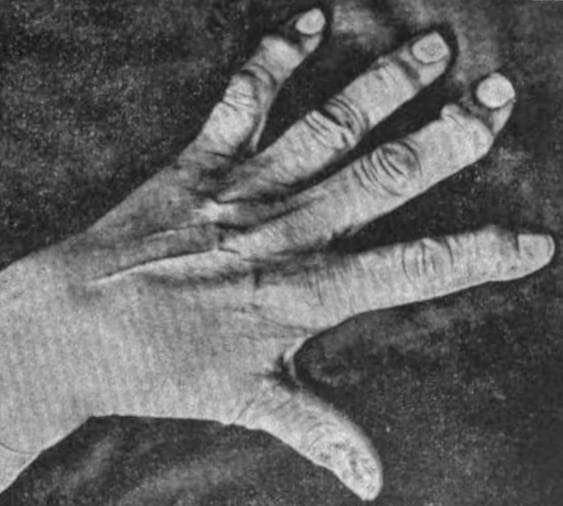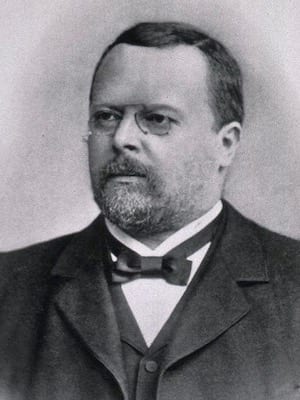Ottomar Rosenbach
Ottomar Ernst Felix Rosenbach (1851 – 1907) was a German physician.
He published numerous works across a wide scope of medicine, including clinical signs, disease processes, novel laboratory methods in diagnosis, psychotherapy, heart disease pathophysiology, philosophy, and sociomedicine.
Controversially, Rosenbach opposed the bacteriology ideas, arguing that there was lacking evidence that microorganisms were part of the aetiology of certain diseases.
Dr Ottomar Rosenbach’s name is eponymous with Rosenbach sign of aortic regurgitation (1878), Rosenbach sign of autoimmune hyperthyroidism, Rosenbach-Semon Law (1880), and Rosenbach test (1880).
Biography
- Born 4 January 1851 in Krappitz, Silesia (now Poland)
- 1874 – Awarded M.D. degree following education at the universities of Berlin and Wrocław (German: Breslau)
- 1874-87 – Assistant at the medical hospital and dispensary of the University of Jena, Germany
- 1878 – Appointed privatdozent at the University of Wrocław, Poland
- 1878 – Assistant at Allerheiligen Hospital, Wrocław
- 1887-93 – Chief physician at Allerheiligen Hospital (All Saint’s Hospital), Wrocław
- 1888-96 – Assistant professor at University of Wrocław
- 1896 – Travelled back to Berlin to pursue research
- Died 20 March 1907, Berlin, Germany
Medical Eponyms
Rosenbach sign (1878)
Pulsatile liver with aortic regurgitation.
ln jüngster Zeit habe ich wiederum einen Fall von insufficienz der Aortenklappen allerhöchsten Grades beobachtet, in welchem exquisite systolische Leberpulsation bestand, ohne dass Zeichen einer Insufficienz der Tricuspidalis vorhanden.
Recently I have again observed a case of incompetence of the aortic valves of the highest degree, in which exquisite systolic liver pulsation existed, without signs of tricuspid insufficiency.
- Rosenbach O. Über arterielle Leberpulsation. 1878: 4(40): 498-500, 509-511, 4(42): 519-522
- Rosenbach O. Ueber artificielle Herzklappenfehler, Archiv für experimentelle Pathologie und Pharmakologie. 1878; 9(1-2): 1-30
- Rosenbach O. Pulsation der Leber: In Die Functionsstörungen am Aortenostium. 1897
Rosenbach phenomenon (1876)
Absence of the abdominal reflexes on the side of a hemiparesis and also in the presence of acute abdominal disease.
Wendet man das beschriebene Verfahren bei Hemiplegieen aus cerebraler Ursache an, so erfolgt auf der gelähmten Seite kein solcher Bauchreflex, wie ich das Phänomen nennen möchte, während auf der gesunden Seite derselbe unverändert und prompt eintritt.
If the method described is applied to hemiplegia of cerebral origin, there is no such abdominal reflex on the paralyzed side as I would call the phenomenon, while on the healthy side it remains unchanged and prompt
- Rosenbach O. Ein Beitrag zur Symptomatologie cerebraler Hemiplegieen. Archiv für Psychiatrie und Nervenkrankheiten. 1876; 6(3): 845-851.
Rosenbach-Semon Law (1880)
Lesions of the anterior horn cells on anterior spinal nerve trunks result in a paralysis of extensor before flexor muscles, and that the extensors are also the last to recover after paralysis.
- Rosenbach O. Zur Lehre von der doppelseitigen totalen Lähmung des nerv. laryngeu (inferior recurrens). Breslauer ärztliche Zeitschrift, 1880; 2: 14-16.
- Semon F. Clinical remarks on the proclivity of the abductor fibres of the the recurrent laryngeal nerve to become affected sooner than the adductor fibres, or even exclusively, in cases of undoubted central or peripheral injury or disease of the roots or trunks of the pneumogastri, spinal accessory, or recurrent nerves. Archives of Laryngology, 1881; 2: 197-222.
Rosenbach test (1880)
Qualitative medical test to detect the presence of bile in urine. The urine is passed through the same filter paper several times, dried and a drop of nitric acid is added. In the presence of bile a yellow spot with rings of red, violet, blue and green will appear. Also known as the Gmelin test (Leopold Gmelin 1788-1853)
- Rosenbach O. Beitrag zur Lehre von der periodischen Hämoglobinurie. Berliner klinische Wochenschrift, 1880; 17: 132-134, 151-153
Key Medical Attributions

Rosenbach 1890
Major Publications
- Rosenbach O. Über arterielle Leberpulsation. 1878: 4(40): 498-500, 509-511, 4(42): 519-522
- Rosenbach O. Ueber artificielle Herzklappenfehler, Archiv für experimentelle Pathologie und Pharmakologie. 1878; 9(1-2): 1-30
- Rosenbach O. Beitrag zur Lehre von den Krankheiten des Verdauungsapparates. Deutsche Medizinische Wochenschrift, 1879; 5: 535-538, 555-557
- Rosenbach O. Zur Lehre von der doppelseitigen totalen Lähmung des nerv. laryngeu (inferior recurrens). Breslauer ärztliche Zeitschrift, 1880; 2: 14-16. [Rosenbach-Semon law]
- Rosenbach O. Beitrag zur Lehre von der periodischen Hämoglobinurie. Berliner klinische Wochenschrift, 1880; 17: 132-134, 151-153. [Rosenbach test]
- Rosenbach O. Über musikalische Herzgeräusche – Nebst Bemerkungen über die Entstehung pseuddokardialer Geräusche
- Rosenbach O. Die Auftreibung der Endphalangen der Finger, eine bisher noch nicht beschriebene trophische Störung. Centralblatt für Nervenheilkunde. 1890; 13: 199-205. [Heberden nodes]
- Rosenbach O. Grundlagen, Aufgaben und Grenzen der Therapie : nebst einem Anhange: Kritik des Koch’schen Verfahrens. 1891
- Rosenbach O. Die Seekrankheit. 1896
- Rosenbach O. Pulsation der Leber: In Die Functionsstörungen am Aortenostium. 1897 [Rosenbach sign]
- Rosenbach O. Physician versus bacteriologist. 1904 (English translation)
- Rosenbach O. Die Krankheiten des Herzens und ihre Behandlung. 1907
- Collaborator on: Eulenburg A. Real-Encyclopädie der gesammten Heilkunde: Medicinisch-chirurgisches Handwörterbuch für praktische Ärzte. 1880.
References
- Review: Musical heart murmurs, with remarks on the occurrence of pseudocardial murmurs. By Dr. Ottomar Rosenbach. The American journal of the medical sciences 1885; 89: 235- 238.
- Ottomar Rosenbach. Biographisches Lexikon, hervorragender Ärzte des neunzehnten Jahrhunderts. 1901: 1419.
- Isidore Singer, Frederick T. Haneman. The Jewish Encyclopedia: a descriptive record of the history, religion, literature, and customs of the Jewish people from the earliest times to the present day [Ottomar Ernst Felix Rosenbach]. Funk & Wagnalls, New York, 1906;10:473.
- Voswinckel, P. Rosenbach, Ottomar. in: Neue Deutsche Biographie. 2005; 22:S56-57.
- Hau, M. The Cult of Health and Beauty in Germany: A Social History, 1890-1930. The University of Chicago Press, Chicago and London. 2003: 104.
- Zhang G. Eponyms in Aortic Regurgitation. LITFL 2019
- Bibliography. Ottomar Rosenbach. WorldCat Identities
Doctor in Australia. Keen interest in internal medicine, medical education, and medical history.

